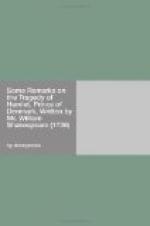be treated as they ought, nor work’d up to that
Height which they are here, and were formerly at Athens,
&c. and Love, for that Reason among others is made
to be the Basis of almost all their Tragedies.
Nay, the Education of the People under such a Government,
prevents their delighting in such Performances as pleased
an Athenian or a Roman, and now delight
us Britons. Thus every Thing conduces
to debase Tragedy among them, as every Thing here
contributes to form good Tragick Writers; yet how few
have we! And what is very remarkable, each Nation
takes Delight in that, which, in the Main, they the
least excel in, and are the least fit for. The
Audience in England is generally more crowded
at a Comedy, and in France at a Tragedy; yet
I will venture to affirm, (and I shall be ready upon
Occasion to support my Assertion by good Reasons) that
no Comick Writer has ever equal’d Moliere,
nor no Tragick Writer ever came up to Shakespeare,
Rowe, and Mr. Addison. Besides the
many Reasons I have already given in Relation to the
French, I might add, that their Language is
less fit for Tragedy, and the Servitude of their Rhime
enervates the Force of the Diction. And as for
Our Comedies, they are so full of Lewdness, Impiety
and Immorality, and of such complicated perplexed
Plots, so stuffed with Comparisons and Similies, so
replenished with Endeavours at Wit and Smartness, that
I cannot forbear saying, that whoever sees or reads
them for Improvement (I make some Exceptions in this
Censure) will find a contrary Effect; and whatever
Man of a True Taste expects to see Nature, either in
the Sentiments or Characters, will (in general) find
himself very much mistaken.
FINIS.
The Remarks was printed anonymously, in 1736, with the following title page:
Some / Remarks / on the / Tragedy / of / Hamlet Prince of Denmark, / Written by / Mr. William Shakespeare. / [double rule enclosing a printer’s device] / London: / Printed for W. Wilkins, in Lombard-/ Street. M,DCC,XXXVI. price 1s.
The edition of 1736 was reprinted in London, 1864, for sale by John Russell Smith, with an identical title page. The reprint bore the following cover:
Reprints of Scarce Pieces of Shakespeare
Criticism. No. 1. Remarks
on Hamlet,
1736.
The usual ascription of the essay heretofore to Sir Thomas Hanmer derives from the statement by Sir Henry Bunbury, on page 80 of his The Correspondence of Sir Thomas Hanmer, Bart, London, 1838, that he had “reason to believe that he was the author ...”
—Wallace A. Bacon Northwestern University
ANNOUNCING
THE
Publications
OF
THE AUGUSTAN REPRINT SOCIETY




